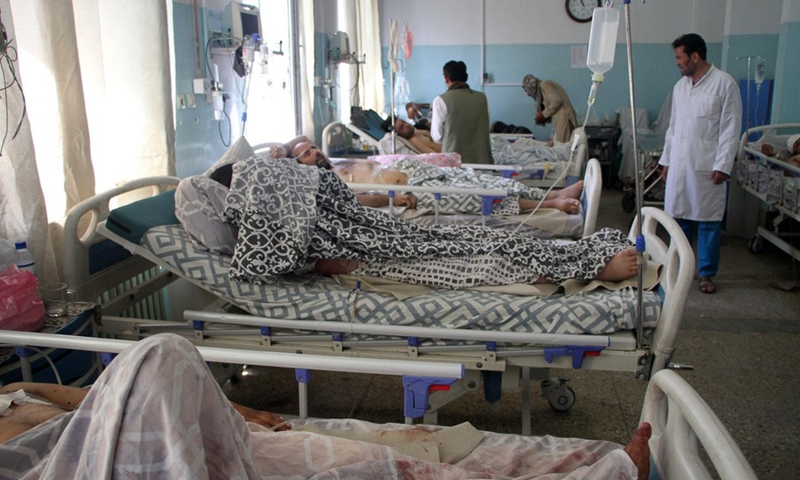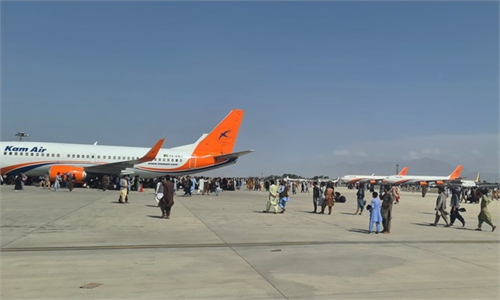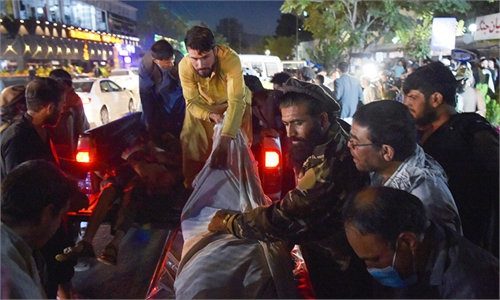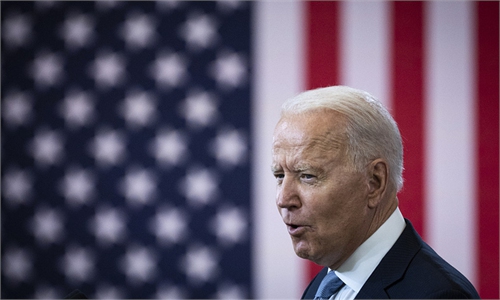
People injured in the Kabul airport attacks receive medical treatment at a local hospital in Kabul, capital of Afghanistan, Aug. 27, 2021.(Photo: Xinhua)
The terror attacks outside Kabul airport on Thursday show that the soil for terrorist activities has not been eliminated. Some power vacuum areas are forming. Terrorist groups inside Afghanistan and certain regions in the Middle East are very likely to take advantage of the chaos and become a major security hazard in the region and even the world again. We must be highly vigilant about this and steadily deal with it.First, terrorist forces in Afghanistan may regain the conditions for their own growth. Since the US and the UK launched war in Afghanistan, they have failed to eradicate the threat of terrorism, while the number of terrorist groups has increased. Although the Afghan Taliban regained power, it is still hard to quickly form an effective governance structure.
Afghanistan's complicated geographic environment and social structure may make the country become a habitat for terrorist groups once again. If the new Afghan government lacks the ability to resolve the growth of terrorist forces in its own country, then it may be difficult to get rid of the influence of civil wars and conflicts. Afghanistan may continue to fall into political turmoil and social unrest, and the country will have difficulty moving ahead in the future. The international community, especially responsible neighboring countries, should support Afghanistan's reconstruction as much as possible. This will maintain their own security, and also ensure future development.
Second, regional terrorist groups have not eased their infiltration of China. Over the past two decades, some terrorist groups have circulated, gathered and developed in Afghanistan and other regional countries, posing a serious threat to international and regional peace and security. Particularly, the East Turkistan Islamic Movement, as an international terrorist group listed by the UN Security Council, poses a direct threat to China's national security.
The head of the Afghan Taliban has already made it clear to China that no force will be allowed to use the Afghan territory to do anything harmful to China. However, the turmoil in the region might provide a new opportunity for terrorists, ethnic separatists and religious extremists to join forces with each other. According to some media, the US troops have left various weapons and equipment in Afghanistan during the withdrawal. It has, in fact, turned Afghanistan into an arsenal for terrorist groups. This may lead to increased security pressure in China's western border areas. Therefore, the infiltration and influence of international terrorist and extremist forces on China may become greater in the future.
Third, we should be vigilant that some Western countries may make despicable moves toward China by free riding on terrorism. Judging from how some anti-China forces in the West hyped up Xinjiang-related issues recently, some Western politicians will definitely continue linking up terrorism with certain countries, governments, ethnicities, and religions. They will even allow terrorist organizations to grow under the banner of protecting ethnic minorities and religious freedom. It is highly possible that Washington might use terrorist forces, organizations, and activities to slow down the development and disrupt the resource allocation capacity of key strategic adversaries. We should be careful not to let the US use such devices to engage in the "great power competition."
Last but not least, the international community needs to strengthen the cooperation on countering terrorism. After all, terrorism is the common enemy of all humanity and one of the main cancers that endanger world peace and development. The failure of the US and some other Western countries in Afghanistan has once again proven that the emphasis on only strikes will not be helpful to fight terrorism. And putting the interests of some countries above others and even humankind cannot fundamentally solve the problem of international terrorism.
Also, it should be noted that Afghanistan was an observer state of the Shanghai Cooperation Organization (SCO). If the Afghan Taliban will continue such a relationship with the organization, then the SCO's counter-terrorism function needs to be constantly strengthened according to the situation in Afghanistan. Meanwhile, SCO member states should be encouraged and coordinated to take all necessary ways to proactively eliminate terrorism, with prevention as the primary means.
The author is a research fellow at the National Defense University of the People's Liberation Army. opinion@globaltimes.com.cn



